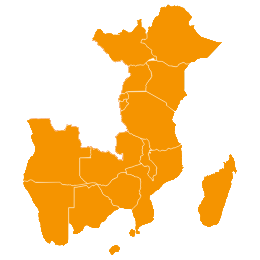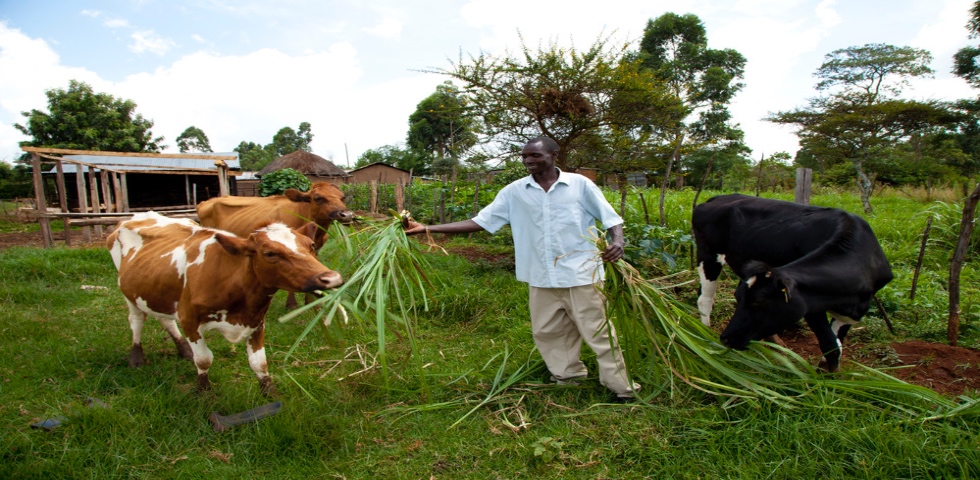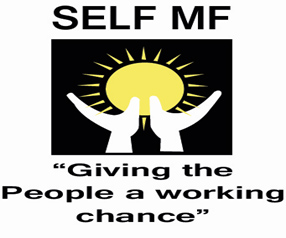Wakulima Digital
“Receiving cash at the bank was a problem as it was difficult to manage funds, one could be enticed to buy unnecessary things instead of investing in agricultural production.”
Ms. Wema Kipalile, a maize farmer in Iringa District, TanzaniaBACKGROUND
Prior to selling their produce, most farmers have to take out loans, both for preparing their farms and to meet household needs. Because prices are lowest during the harvest season, many are forced to sell at low prices, and are unable to afford loan repayments. This often keeps them in a poverty cycle, unable to invest in improved technology such as seeds and fertilizers
WHAT’S INVOLVED
The SELF Microfinance solution is loan account product electronically programmed to release loan fund instalments throughout the year to cover specific production activities and meet household obligations. At harvest time, farmers deposit their produce at warehouses in exchange for a receipt that can be used as collateral when taking loans with the MFIs.
EXPLORE THIS SOLUTION
Wakulima Digital is a loan-disbursement solution that enables farmers to meet their financial obligations during post-harvest price downturns.

Countries involved
Tanzania
Project partners
Ecumenical Church Loan Fund, Mufindi Community Bank Mahanje SACCO
Project dates
2018 – Present
Share this solution
Bookmark this solution
BookmarkShow Full Solution
Summary
Wakulima Digital is a loan-disbursement solution that enables farmers to meet their financial obligations during characteristic post-harvest price downturns. By accessing loans through their mobile phones, poor smallholder farmers can secure funds without having to sell their produce at low prices during harvest periods.
Challenge/Problem
In much of sub-Saharan Africa, commodity markets are unstable. Commodity prices, which rise throughout the year, are lowest during the harvest season. In some cases, agricultural commodity prices fall so low that farmers opt not to harvest their crops, as harvesting would cost more than the crops sell for. During the agricultural production process, many farmers use their savings and even take out loans, exhausting their income before the harvest. While crops are ripening, some farmers need additional money to meet general household commitments such as food, clothing and school fees. Having spent most of their income on buying inputs, running their farms and supporting their households, smallholder farmers tend to have cash flow challenges at harvest times. To meet their household needs, most farmers are forced to sell part or all their crops at very low prices. In some cases, farmers fail to generate enough income to cover loan repayments, leaving them unable to invest in improved technology (such as seeds, fertilizers and mechanization) for the next season.
Solution
In collaboration with three microfinance institutions, SELF Microfinance (SELF MF) developed an income-smoothing product that enables smallholder farmers to meet their household obligations in times of hardship. This loan account product is electronically programmed to release loan fund instalments throughout the year to cover specific production activities and meet household obligations.
During harvest time, smallholder farmers can deposit their produce at warehouses affiliated with microfinance institutions (MFIs) in exchange for a receipt. This receipt can be used as collateral with the MFIs in order to take out loans that are disbursed throughout the year. In doing so, farmers can meet their household obligations and repay any the production loans while waiting for prices to rise so they can earn more money selling their crops.
SELF MF implements this technology with three MFIs: Ecumenical Church Loan Fund Tanzania in the Arusha region, Mufindi Community Bank in the Iringa region and Mahanje SACCOS in the Ruvuma region. Through the three institutions, SELF MF expects to reach 15,000 smallholder farmers involved in maize, paddy and bean farming.
Results
- During the 2018/19 farming season, SELF MF digitally disbursed US$1,169,604.90 to 6,340 smallholder farmers (3,239 male and 3,101 female). Digital disbursement has improved smallholders’ ability to manage their funds, as money is deposited directly into their mobile accounts.
- Disbursing loans in tranches results in cost savings both to the MFI and to the farmer. For instance, if the loan is for US$ 500,000, this whole amount is not disbursed to the MFI at once, the disbursement can be made in 3 tranches in three months’ period. The first tranche will be charged interest rate for 12 months’ period, the 2nd for 9 months and the third for 6 months.
- The income-smoothing part of the loan ensures smallholder farmers can access funds throughout the farming season. Digital disbursement has reduced payment time from 14 days to seven. In additional, smallholders no longer need to visit the MFI for loan disbursement and repayment, so they can spend more time in the field.
- Following the financing arrangement with the warehouses, paddy stored increased from 37.7 metric tons in 2017 to 400 metric tons in 2018. Depositing paddy in the warehouse reduced post-harvest losses, increased food security and ensured that smallholder farmers could take out loans using their deposit receipts as credit guarantee. By storing their paddy in warehouses, farmers could sell the paddy for 63 per cent more, thereby raising their incomes.
- Additionally, 14,538 smallholder farmers (7,852 men and 6,658 women) from the regions of Iringa, Ruvuma and Arusha participated in trainings to improve their financial literacy and understanding of income-smoothing products.
Lessons Learned/Potential for replication
- With increased use of mobile phones, there is hope for including smallholder farmers in formal agricultural value chains by connecting them to input suppliers, lenders and agricultural advisory providers. Services could be bundled directly to farmers.
- Financial transaction logs created by digital solutions such as Wakulima Digital can be used to generate an economic identity and financial history, which banks and other financial institutions require to access formal financial services.
- SELF MF’s solution can be widened to include disbursement of non-agricultural loan products, such as micro-loans for housing. Farmers who live far from banks could use digital systems not only to receive funds, but also to depositing savings and repay loans.
- The warehouse receipt system works well when coupled with post-harvest financing arrangement.
Next Steps
SELF MF intends to increase their sensitization and training of smallholder farmers on the benefits of the warehouse receipt system. They also plan to train Agricultural and Marketing Cooperative Societies (AMCOS) that are working with paddy farmers to effectively and sustainably manage the warehouses in collaboration with the Warehouse Receipt Regulator Board.
SELF MF will roll out the product to more partners who finance smallholder farmers, encouraging them to install the management information system (MIS) and digitalize loan disbursement and repayment. The broader objective is to enable more farmers to share their data with a variety of third-party service providers, such as financial services providers, input suppliers and agricultural advisory providers.
Solution Video
Last update: 07/07/2021


